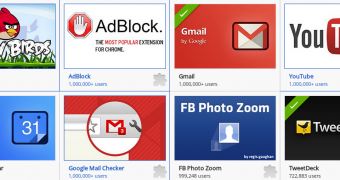Almost a year ago, to much fanfare and a bit later than planned, Google launched the Chrome Web Store, an app store for the web. The idea is to make it easy and fun to find applications from the web.
There are plenty of interesting apps online, but finding them has been chore. A central place to find them all, with descriptions, reviews, search and so on, could be a great boon for all of them.
At least, that's what Google believed when it came up with the Web Store. It's been hard to judge the success of the store to date though. While there are certainly a lot of apps in there.
There are six apps or extensions in the Web Store with more than one million users, though Google doesn't provide more detailed stats after an app reaches this milestone.
But four of them are Google are Google's own, Gmail, YouTube, Google Calendar and Google Mail Checker, a Chrome extension also built by Google. The top app is Angry Birds which, well, doesn't really mean anything in this context.
And the second most popular app is AdBlock, actually an extension, an ad blocker for Chrome, unrelated to other projects that share its name.
Now, at this point it's important to define what an web app mean, for Google Chrome. There are two types of apps, simple wrappers that direct users to websites, which is what most of the top ones do, including all of Google's top apps.
A second type of web app is something built with web technologies but which runs locally in the browser, albeit linked to the cloud.
The top app that would actually qualify as an web app and not just a bookmark to a website is TweetDeck which has about 722,000 users. This version of TweetDeck is only available for Chrome, the only other option is the desktop app. You can use TweetDeck in any other browser.
Of course that doesn't make the TweetDeck app 'better.' After all, one of the things that make an web app great is that it works everywhere.
Which makes judging the success of the Chrome Web Store hard. On the one hand, dedicated apps, that couldn't have existed without the Chrome Web Store and the web app model, are few and far between.
But if you believe that the Web Store's role is purely a curation one, then being able to find interesting stuff in the Web Store, even if it's just a link to a website, is great.
Then again, it's hard to believe that people wouldn't have been able to discover Gmail or Google Calendar, the most popular apps, without the Web Store.
And, with 200 million people using Chrome, it seems that only a few million use apps or extensions at all. Of course, Google has a long term plan for Chrome, Chrome OS and Chromebooks, and the Web Store, so perhaps things will be different two years after launch.

 14 DAY TRIAL //
14 DAY TRIAL //